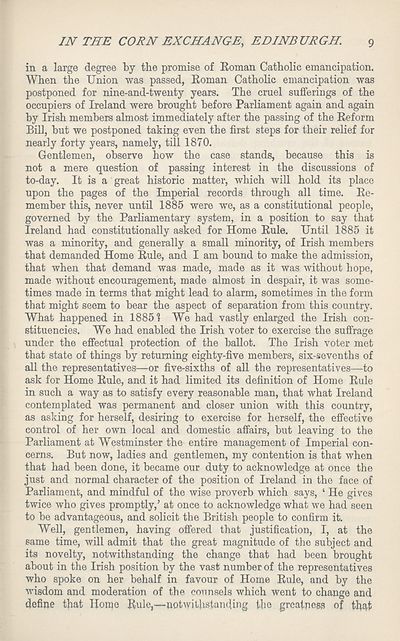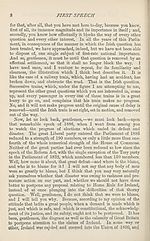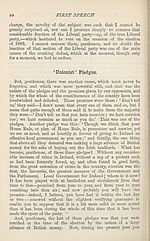Download files
Complete book:
Individual page:
Thumbnail gallery: Grid view | List view

IN THE CORN EXCHANGE, EDINBURGH. 9
in a large degree by the promise of Roman Catholic emancipation.
When the Union was passed, Roman Catholic emancipation was
postponed for nine-and-twenty years. The cruel sufferings of the
occupiers of Ireland were brought before Parliament again and again
by Irish members almost immediately after the passing of the Reform
Bill, but we postponed taking even the first steps for their relief for
nearly forty years, namely, till 1870.
Gentlemen, observe how the case stands, because this is
not a mere question of passing interest in the discussions of
to-day. It is a great historic matter, which will hold its place
upon the pages of the Imperial records through all time. Re¬
member this, never until 1885 were we, as a constitutional people,
governed by the Parliamentary system, in a position to say that
Ireland had constitutionally asked for Home Rule. Until 1885 it
was a minority, and generally a small minority, of Irish members
that demanded Home Rule, and I am bound to make the admission,
that when that demand was made, made as it was without hope,
made without encouragement, made almost in despair, it was some¬
times made in terms that might lead to alarm, sometimes in the form
that might seem to bear the aspect of separation from this country.
What happened in 18851 We had vastly enlarged the Irish con¬
stituencies. We had enabled the Irish voter to exercise the suffrage
under the effectual protection of the ballot. The Irish voter met
that state of things by returning eighty-five members, six-sevenths of
all the representatives—or five-sixths of all the representatives—to
ask for Home Rule, and it had limited its definition of Home Rule
in such a way as to satisfy every reasonable man, that what Ireland
contemplated was permanent and closer union with this country,
as asking for herself, desiring to exercise for herself, the effective
control of her own local and domestic affairs, but leaving to the
Parliament at Westminster the entire management of Imperial con¬
cerns. But now, ladies and gentlemen, my contention is that when
that had been done, it became our duty to acknowledge at once the
just and normal character of the position of Ireland in the face of
Parliament, and mindful of the wise proverb which says, ‘ He gives
twice who gives promptly,’ at once to acknowledge what we had seen
to be advantageous, and solicit the British people to confirm it.
Well, gentlemen, having offered that justification, I, at the
same time, will admit that the great magnitude of the subject and
its novelty, notwithstanding the change that had been brought
about in the Irish position by the vast number of the representatives
who spoke on her behalf in favour of Home Rule, and by the
wisdom and moderation of the counsels which went to change and
define that Hoipo Rule,—notwithstanding the greatness of th^t
in a large degree by the promise of Roman Catholic emancipation.
When the Union was passed, Roman Catholic emancipation was
postponed for nine-and-twenty years. The cruel sufferings of the
occupiers of Ireland were brought before Parliament again and again
by Irish members almost immediately after the passing of the Reform
Bill, but we postponed taking even the first steps for their relief for
nearly forty years, namely, till 1870.
Gentlemen, observe how the case stands, because this is
not a mere question of passing interest in the discussions of
to-day. It is a great historic matter, which will hold its place
upon the pages of the Imperial records through all time. Re¬
member this, never until 1885 were we, as a constitutional people,
governed by the Parliamentary system, in a position to say that
Ireland had constitutionally asked for Home Rule. Until 1885 it
was a minority, and generally a small minority, of Irish members
that demanded Home Rule, and I am bound to make the admission,
that when that demand was made, made as it was without hope,
made without encouragement, made almost in despair, it was some¬
times made in terms that might lead to alarm, sometimes in the form
that might seem to bear the aspect of separation from this country.
What happened in 18851 We had vastly enlarged the Irish con¬
stituencies. We had enabled the Irish voter to exercise the suffrage
under the effectual protection of the ballot. The Irish voter met
that state of things by returning eighty-five members, six-sevenths of
all the representatives—or five-sixths of all the representatives—to
ask for Home Rule, and it had limited its definition of Home Rule
in such a way as to satisfy every reasonable man, that what Ireland
contemplated was permanent and closer union with this country,
as asking for herself, desiring to exercise for herself, the effective
control of her own local and domestic affairs, but leaving to the
Parliament at Westminster the entire management of Imperial con¬
cerns. But now, ladies and gentlemen, my contention is that when
that had been done, it became our duty to acknowledge at once the
just and normal character of the position of Ireland in the face of
Parliament, and mindful of the wise proverb which says, ‘ He gives
twice who gives promptly,’ at once to acknowledge what we had seen
to be advantageous, and solicit the British people to confirm it.
Well, gentlemen, having offered that justification, I, at the
same time, will admit that the great magnitude of the subject and
its novelty, notwithstanding the change that had been brought
about in the Irish position by the vast number of the representatives
who spoke on her behalf in favour of Home Rule, and by the
wisdom and moderation of the counsels which went to change and
define that Hoipo Rule,—notwithstanding the greatness of th^t
Set display mode to:
![]() Universal Viewer |
Universal Viewer | ![]() Mirador |
Large image | Transcription
Mirador |
Large image | Transcription
| Antiquarian books of Scotland > Politics & government > Political speeches in Scotland in 1890 > (13) |
|---|
| Permanent URL | https://digital.nls.uk/126568446 |
|---|
| Description | Thousands of printed books from the Antiquarian Books of Scotland collection which dates from 1641 to the 1980s. The collection consists of 14,800 books which were published in Scotland or have a Scottish connection, e.g. through the author, printer or owner. Subjects covered include sport, education, diseases, adventure, occupations, Jacobites, politics and religion. Among the 29 languages represented are English, Gaelic, Italian, French, Russian and Swedish. |
|---|

